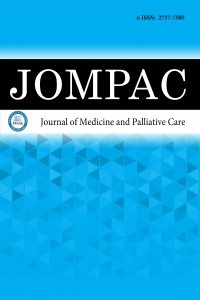1.
Bray F, Ferlay J, Soerjomataram I, Siegel RL, Torre LA, Jemal A.Global cancer statistics 2018: GLOBOCAN estimates of incidenceand mortality worldwide for 36 cancers in 185 countries. CACancer J Clin. 2018;68(6):394-424.
2.
Demirci H, Ozturk K, Tanoglu A, et al. Helicobacter pyloricolonization density is an important risk factor for eradicationtherapy. J Gastrointestin Liver Dis. 2022;31(2):163-167.
3.
Kaplan M, Tanoglu A, Duzenli T, Tozun AN. Helicobacterpylori treatment in Turkey: current status and rational treatmentoptions. North Clin Istanb. 2019;7(1):87-94.
4.
Kalkanlı Taş S, Kırkık D, Öztürk K, Tanoğlu A. Determinationof B- and T- cell epitopes for Helicobacter pylori cagPAI: An insilico approach. Turk J Gastroenterol. 2020;31(10):713-720.
5.
Ford AC, Yuan Y, Moayyedi P. Helicobacter pylori eradicationtherapy to prevent gastric cancer: systematic review and meta-analysis. Gut. 2020;69(12):2113-2121.
6.
Algra AM, Rothwell PM. Efects of regular aspirin on long termcancer incidence and metastasis: a systematic comparison ofevidence from observational studies versus randomised trials.Lancet Oncol. 2012;13(5):518-527.
7.
Kim YL, Kim SY, Kim KJ, et al. Long-term low-dose aspirin usereduces gastric cancer incidence: a nationwide cohort study.Cancer Res Treat. 2016;48(2):798-805.
8.
Bofei Li, Cheung KS, Wong IY, et al. Nonaspirin nonsteroidalanti-inflammatory drugs and gastric cancer risk afterHelicobacter pylori eradication: a territory-wide study. Cancer.2021;127(11):1805-1815.
9.
Miguel RA, Luis A, Rodríguez GI, et al. Clopidogrel and low-doseaspirin, alone or together, reduce risk of colorectal cancer. ClinGastroenterol Hepatol. 2019;17(10):2024-2033.
10.
Tsai TJ, Lai KH, Hsu PI, et al. Upper gastrointestinal lesions inpatients receiving clopidogrel anti-platelet therapy. J Formos MedAssoc. 2012;111(12):705-710.
11.
Fork FT, Lafolie P, Toth E, Lindgarde F. Gastroduodenal toleranceof 75 mg clopidogrel versus 325 mg aspirin in healthy volunteers.A gastroscopic study. Scand J Gastroenterol. 2000;35(5):464-469.
12.
Lanza FL. A review of gastric ulcer and gastroduodenal injury innormal volunteers receiving aspirin and other non-steroidal anti-inflammatory drugs. Scand J Gastroenterol Suppl. 1989;163:24-31.
13.
Chan FK, Ching JY, Hung LC, et al. Clopidogrel versus aspirinand esomeprazole to prevent recurrent ulcer bleeding. N Engl JMed. 2005;352(3):238-244.
14.
Sinha M, Gautam L, Shukla PK, et al. Current perspectivesin NSAID-induced gastropathy. Mediators Inflamm.2013;2013:258209.
15.
Wang D, Dubois RN. Prostaglandins and cancer. Gut.2006;55(1):115-122.
16.
Cheung KS, Chan EW, Wong AYS, et al. Aspirin and risk ofgastric cancer after Helicobacter pylori eradication: a territory-wide study. J Natl Cancer Inst. 2018;110(7):743-749.
17.
Weltermann T, Schulz C, Macke L. Effect of frequently prescribeddrugs on gastric cancer risk. Best Pract Res Clin Gastroenterol.2021;50-51:101741.
18.
Altayar O, Davitkov P, Shailja C, et al. AGA Technical reviewon gastric intestinal metaplasia - epidemiology and risk factors.Gastroenterology. 2020;158(3):732-744.
19.
Song H, Ekheden IG, Zheng z, et al. Incidence of gastriccancer among patients with gastric precancerous lesions:observational cohort study in a low risk Western population. BMJ2015;351:3867.
20.
Sonnenberg A, Genta RM. Changes in the gastric mucosa withaging. Clin Gastroenterol Hepatol. 2015;13(13):2276-22781.
21.
Ozdil K, Sahin A, Kahraman R, et al. Current prevalence ofintestinal metaplasia and Helicobacter pylori infection indyspeptic adult patients from Turkey. Hepatogastroenterology.2010;57(104):1563-1566.
22.
Kiyak M, Duzenli T. Helicobacter pylori colonization densitymay have an important role in the development of celiac disease.Turk J Acad Gastroenterol. 2023;22(1):6-12.
23.
Nagata N, Niikura R, Sekine K, et al. Risk of peptic ulcer bleedingassociated with Helicobacter pylori infection, nonsteroidal anti-inflammatory drugs, low-dose aspirin, and antihypertensivedrugs: a case-control study. J Gastroenterol Hepatol.2015;30(2):292-298.
24.
Köseoğlu H, Duzenli T, Sezikli M. Gastric neuroendocrineneoplasms: a review. World J Clin Cases. 2021;9(27):7973-7985.
25.
Annibale B, Esposito G, Lahner E. A current clinical overviewof atrophic gastritis. Expert Rev Gastroenterol Hepatol.2020;14(2):93-102.
26.
Clemens A, Strack A, Noack H. Anticoagulant-relatedgastrointestinal bleeding—could this facilitate early detectionof benign or malignant gastrointestinal lesions? Ann Med.2014;46(8):672-678.
27.
Dixon MF, Genta RM, Yardley JH, Correa P. Classification andgrading of gastritis. The updated Sydney System. InternationalWorkshop on the Histopathology of Gastritis, Houston 1994. AmJ Surg Pathol. 1996;20(10):1161-1181.

